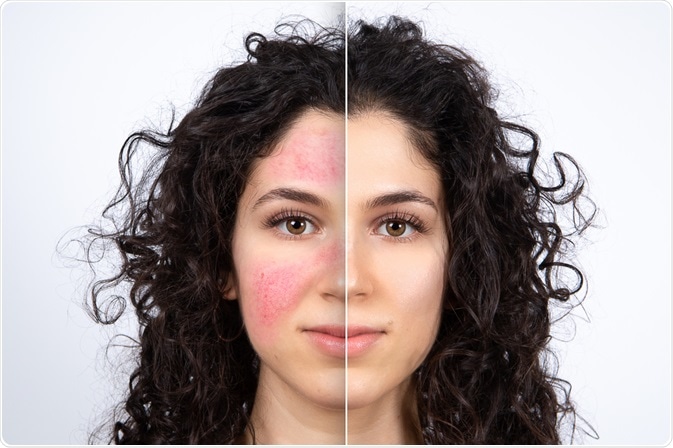The disease course of rosacea is waxing and waning in nature, with episodes of symptom aggravation known as "flare-ups" interspersed between periods of relatively few and less bothersome symptoms.
Flare-ups are triggered by various environmental or lifestyle factors that rosacea sufferers should try to avoid. Trigger avoidance is an important part of the treatment approach for rosacea.

Image Credit: sruilk / Shutterstock.com
Triggers of flare-ups
Examples of lifestyle and environmental factors that may trigger a flare-up include:
- Sun exposure, hot or cold weather, and wind
- Emotional stress
- Heavy exercise
- Consumption of alcohol, spicy foods, or hot drinks
- Hot baths
- Certain cosmetics
- Certain medications
- Certain medical conditions
- The menopause
Each person with rosacea has their own unique set of triggers. In order to help identify and avoid these, patients may be asked to maintain a diary recording any known exposure to triggers before a flare-up occurs. This may take some time, but usually, a pattern emerges from this information that can help physicians identify specific inducers of flare-ups. Surveys have shown that trigger avoidance has been found to improve symptoms by up to 90%.
Some of the lifestyle measures that people with rosacea can also take include:
- Avoiding sun exposure
- Avoiding spicy food, foods suspected to cause flare-ups, hot beverages, and alcohol
- Avoiding heavy exercise
- Practicing meditation and other relaxation techniques to ease stress
- Choosing cosmetics and skin care products carefully.
Skincare
As rosacea patients have particularly sensitive skin, they need to choose skincare products that are designed to maintain the integrity of the skin barrier and therefore avoid products that might irritate their skin. Cleansers, moisturizers, and sunblocks are important, as well as protective products that have a sun protection factor (SPF) of 15 or higher are recommended.
If the patient is allergic to sunscreen or develops irritation, they may use a sunblock that contains zinc or titanium dioxide instead. The ingredients in cosmetics should not cause sensitivity or irritation, nor should they contain volatile substances, irritants, or allergens. After washing the face, the skin should be blotted rather than rubbed dry to reduce any stimulation of the skin that may cause flushing.
Moderate-to-severe symptoms
In mild cases of rosacea, symptoms are seldom severe enough to cause concern. However, in moderate-to-severe cases, the condition can eventually cause facial deformity and adversely affect an individual's social life, occupation, and emotional well-being.
Depression and anxiety commonly manifest in rosacea, which may, in turn, raise the emotional stress levels that can give rise to flare-ups. Psychological counseling may prove useful in these cases, as these mental health professionals can provide patients with advice on how to cope with symptoms and maintain a positive outlook to reduce the impact that rosacea has on their quality of life.
References
Further Reading
Last Updated: Jul 21, 2023